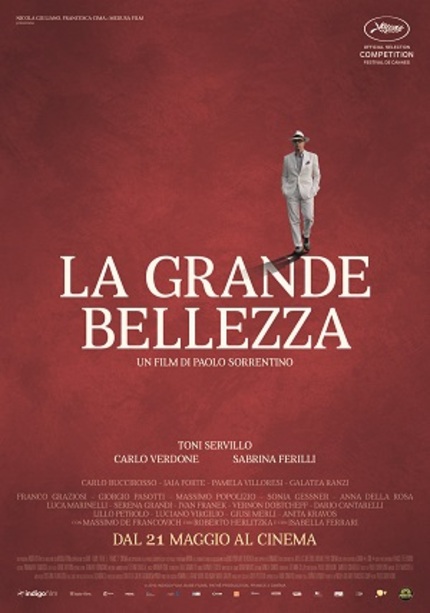Review: THE GREAT BEAUTY Flies Too High And Falls

Once upon a time in Rome there was a guy called Marcello Mastroianni. He wasn't looking for the heart of Saturday night, he was just roaming around trying to figure why the once caput mundi was now filled with clowns dressed as princes and princesses. There in Rome, Mastroianni discovered a new anxiety-inducing way of life. It was Federico Fellini's La Dolce Vita, an evergreen masterpiece now (kinda) resurrected by one of the most important modern Italian directors, Paolo Sorrentino, who has replicated the same idea and directed a sort-of sequel which premiered this year in Cannes, The Great Beauty, now released in Italy.
This time the main character is one of those guys depicted by Fellini in the Sixties, here named Jep Gambardella, a famous writer with only a single book in his bibliography. Said book, The Human Apparatus was enough to help him develop into, not a great author, but a skilled social climber. He is now 65 years old, he is the King of Socialites, he is the one who decides if a party can go on or has to die. He is sometimes more important than the Pope himself.
Not having written a single novel in forty years means that you have to find another way to stay on the scene, like working for a friend's newspaper, or arranging a few bizarre interviews, both of which prove futile distractions from Jep's night life. He usually meets on his rooftop in front of the Colosseum with his friend Romano, a failed writer interpreted by the comedic actor Carlo Verdone, and a bunch of rich people who love to discuss nothing and quote every known writer, thinker or whatever for the purpose of looking clever and cultured. In this landscape Jep Gambardella realizes that nothing has to be taken seriously. Until, that is, he faces the reality of death.
Sadly though, Sorrentino seems a lot like one of the characters he mocks in The Great Beauty. For starters, he has his own addiction problem; he can't make a movie without his beloved crane. Indeed, he flies high with the camera, moving around like a Japanese ghost, showing using its slow movements to show the beauty of Rome: the statues, the palaces, the gardens and those people who still live for something that matters.
To represent these types of people, we have the aforementioned Romano and also, Ramona, a woman, earning a living working as a stripper at 42 years old in her father's nightclub. It's clear that in the middle of the battle between Jep and the Roman high society, these two characters, both of whom have failed in their life somehow, symbolize Rome. Moreover, they are in fact "The Great Beauty" Jep was looking for, physically and intellectually, the two real main columns through which the whole story written by Sorrentino and Umberto Contarello really excels.
But back to that crane. Sorrentino has gotten audiences used to watching him play with this toy, using it to capture the lives of weird protagonists with a weird names and weird lives. Toni Servillo has taken this role throughout Sorrentino's career in The Consequences of Love, One Man Up and Il Divo, serving properly to express the desires of his master. Sean Penn more or less did the same thing in the strange This Must Be The Place.
But it's a game that we know too well, and this time, it gets pretty boring. Basically, you're watching 150 minutes of cranes, moving like drunk giraffes while the story, after two hours of people screaming and quoting Proust, suddenly takes a different path leaving behind Ramona and Romano. Maybe this movie is a predecessor of the next genre Lars Von Trier claims to have created in Nymphomaniac, the "Digressionism".
The Great Beauty starts as a movie about Rome and its society (pretty much like La Dolce Vita), with two different (and long) prologues in which we see the ancient beauty of the City in contrast with the luxurious parties, but then becomes something too big as it focuses on Jep's spiritual crisis and criticism of the Church. (At one point, it compares the Bible to a book of recipes used to avoid important matters as God and poverty). When the first wonderful chapter is closed and a baffling new one opens. Here, a sort of Mother Teresa comes to town, and the movie becomes something else. Jep Gambardella pushes away Rome, and everything we had seen until that moment seems meaningless.
It's an enormous effort, a huge movie that shows how beautiful Rome is, but it is not the masterpiece it wishes it was. What The Great Beauty achieves is the demonstration that Sorrentino must stop floating with his camera and maybe consider how cool tripods can be. More importantly though, he needs to focusing on honing the story rather than simply making everything bigger and bigger until totally losing control of it.







